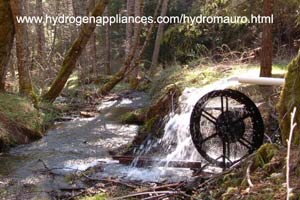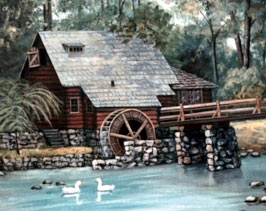 Micro
Hydro-generation (capturing power from small water flows)
Micro
Hydro-generation (capturing power from small water flows)
 Micro
hydro, or small-scale hydro, is one of the most environmentally
benign energy conversion options available, because unlike
large-scale hydro power, it does not attempt to interfere
significantly with river flows. Polluted mine discharges often have
significant flows that may have an inherent value for the mechanical
or electrical power that may be captured. Captured power, in
turn, has the promise of playing a role in the actual treatment of
the polluted water or in providing "green" energy to the power grid.
To date in Pennsylvania, harnessing power from mine discharges has
not been explored to any great extent, but interest in the subject
is certainly increasing.
Micro
hydro, or small-scale hydro, is one of the most environmentally
benign energy conversion options available, because unlike
large-scale hydro power, it does not attempt to interfere
significantly with river flows. Polluted mine discharges often have
significant flows that may have an inherent value for the mechanical
or electrical power that may be captured. Captured power, in
turn, has the promise of playing a role in the actual treatment of
the polluted water or in providing "green" energy to the power grid.
To date in Pennsylvania, harnessing power from mine discharges has
not been explored to any great extent, but interest in the subject
is certainly increasing.
Background information (info from www.ineed2know.org)
What is home hydro power? Hydropower systems that generate up to 100 kilowatts (kW) of electricity are often called micro hydro systems . Most of the systems used by home and small business owners would qualify as micro hydro systems. In fact, a 10 kW system generally can provide enough power for a large home, a small resort, or a hobby farm.
How does a Hydropower System Work? Hydropower systems use the energy in flowing water to produce electricity or mechanical energy. For run-of-the-river hydro projects, a portion of a river's water is diverted to a channel, pipeline, or pressurized pipeline (penstock) that delivers it to a waterwheel or turbine. The moving water rotates the wheel or turbine, which spins a shaft. The motion of the shaft can be used for mechanical processes, such as pumping water, or it can be used to power an electric generator.
Who can use a home or small business hydro power system? To build a small hydropower system, you need access to flowing water. A sufficient quantity of falling water must be available, which usually, but not always, means that hilly or mountainous sites are best. There are specific methods for calculating whether the water flow you have is sufficient to power a turbine.
What are the advantages of using a hydro system? Although there are costs in buying and installing the system, a hydro power system will typically last a long time and maintenance is usually not expensive. In addition, there are a variety of financial incentives available on the state, utility, and federal level for investments in renewable energy systems. They include income tax credits, property tax exemptions, state sales tax exemption, loan programs, and special grant programs.
 What
are the system components? Small run-of-the-river hydro power systems
consist of these basic components: Water conveyance-channel, pipeline, or
pressurized pipeline (penstock) that delivers the water Turbine or
waterwheel-transforms the energy of flowing water into rotational energy
Alternator or generator-transforms the rotational energy into electricity
Regulator-controls the generator Wiring-delivers the electricity
What
are the system components? Small run-of-the-river hydro power systems
consist of these basic components: Water conveyance-channel, pipeline, or
pressurized pipeline (penstock) that delivers the water Turbine or
waterwheel-transforms the energy of flowing water into rotational energy
Alternator or generator-transforms the rotational energy into electricity
Regulator-controls the generator Wiring-delivers the electricity
How do I obtain a permit and water rights? Locally, your first point of contact should be the county engineer. Your state energy office may be able to provide you with advice and assistance as well. In addition, you'll need to contact the Federal Energy Regulatory Commission and the U.S. Army Corps of Engineers. You'll also need to determine how much water you can divert from your stream channel. Each state controls water rights and you may need a separate water right to produce power, even if you already have a water right for another use.
Can I sell my power? Yes, you can usually sell any excess power to your local utility. If you decide to sell, you'll need to contact the utility to find out application procedures, metering and rates, and the equipment the utility requires to connect your system to the electricity grid. (It's generally best to do this before you purchase your hydro system.)
Links
Microhydro web
portal website
Micro hydropower generation basics -
a pretty good starting point... you will have to follow links
referenced of this page.
Micro~Hydroelectric Powerplants website
a very down-to-earth explanation of water power
concepts